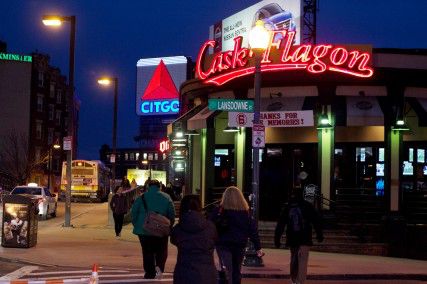
With Boston named the “drunkest” city in America by the Daily Beast for the second year in a row, health professionals said the drinking trend is a cause for concern.
“The statistics worry me, and particularly worry me because drinking has such a negative impact on not just health, but often on performance and on family life and on communities, so there’s a rippling affect of this kind of behavior,” said Patricia Rieker, a medical sociologist at Boston University and consultant to the Centers for Disease Control and Prevention.
On average, adults in Boston consume 15.6 drinks a month, according to Experian Marketing Services.
The Center for Disease Control reported that 20.1 percent of the population of Boston classified as binge drinkers and 7.4 percent of the population classified as heavy drinkers.
Rieker said the effects of heavy drinking not only burden the individual, but also the general public.
“Excessive drinking has lots of negative complications and consequences for not only individual health, but for the well-being of communities,” she said.
Archie Brodsky, co-founder of the program in psychiatry and the law at Harvard University, said student binge drinking is a major concern that the U.S. does not deal with.
“We don’t have ways of teaching young people about drinking that promote responsible behavior, responsible drinking,” he said. “And instead, what you have is a peer group culture has developed its own norms of binge drinking.”
William DeJong, a professor of community health sciences at the BU School of Public Health, said the large population of college students in Boston contributes to the high drinking rates.
“Boston has an awful lot of people in college and a lot of people in their twenties,” he said. “And, these are going to be groups that, compared to the rest of the population nationally, do drink more heavily.”
DeJong said many social problems are made worse by alcohol consumption.
“Almost every sexual assault involves either a perpetrator and/or a victim who’s been drinking,” he said. “[Drinking can also influence] vandalism, property destruction, people getting into fights, and also different kinds of harassment against minority groups and harassment based on peoples’ sexual orientation.”
Brodsky said Boston’s large percentage of Irish Americans has an influence on the drinking rates.
“High rates … of alcohol abuse has been traditionally true in Irish culture and, of course, that has an influence on what goes on in Boston, because you have a lot of Irish Americans in Boston,” he said.
Brodsky also said Boston has a large mix of European cultures that have different ways of treating alcohol.
“In Boston, you have a lot of Irish Americans and Italian Americans and Greek Americans as well as Anglo Saxon Protestants,” Brodsky said. “But they’re all in contact with one another to varying degrees, so the cultures mix and they’re exposed to different models, so people in Boston get a mixed message.”
Rieker said she does not necessarily see alcohol rates going down in the future.
“I think it’s possible for the alcohol problem to escalate more,” she said. “I don’t see the rates going down. They seem to be increasing.”
This is an account occasionally used by the Daily Free Press editors to post archived posts from previous iterations of the site or otherwise for special circumstance publications. See authorship info on the byline at the top of the page.













